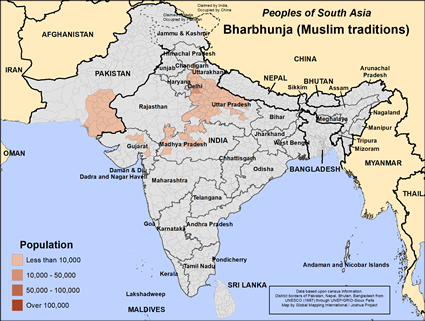Bharbhunja (Muslim traditions) in Pakistan

Send Joshua Project a photo
of this people group. |

Map Source:
People Group data: Omid. Map geography: UNESCO / GMI. Map Design: Joshua Project.
|
| People Name: | Bharbhunja (Muslim traditions) |
| Country: | Pakistan |
| 10/40 Window: | Yes |
| Population: | 5,800 |
| World Population: | 70,800 |
| Primary Language: | Sindhi |
| Primary Religion: | Islam |
| Christian Adherents: | 0.03 % |
| Evangelicals: | 0.03 % |
| Scripture: | Complete Bible |
| Ministry Resources: | Yes |
| Jesus Film: | Yes |
| Audio Recordings: | Yes |
| People Cluster: | South Asia Muslim - other |
| Affinity Bloc: | South Asian Peoples |
| Progress Level: |
|
Introduction / History
The Bharbhunja of Pakistan have their name from their traditional occupation of roasting grains. "Bharbhunja" means frying pan or one who roasts grain in Sanskrit. Some Bharbhunja claim they are descendants of Brahmin or Kshatriya, the two highest castes of Hinduism but other castes place them in the fourth or lowest caste. At one time all Bharbhunja were Hindus. However, with the coming of Muslim rulers to north India and Pakistan, some Bharbhunja converted to Islam.
The Bharbhunja buy grain from other agricultural castes, then roast or parch it to sell this grain to others. The parched grain can serve as a snack or as food for travelers or soldiers. The roasted grain is lighter in weight and lasts longer than uncooked grain.
Besides roasting grain, the Bharbhunja own roadside restaurants, work as laborers and run small businesses. Some Bharbhunja have taken advantage of the Pakistani educational system and become professionals, doctors, teachers and engineers.
The primary languages of the Muslim Bharbhunja of Pakistan are Urdu and Sindh.
Where Are they Located?
The Muslim Bharbhunja live in southeast Pakistan.
What Are Their Lives Like?
The lives of the Bharbhunja depend on their level of education. Most still live in rural areas where modern conveniences do not exist. Electricity, indoor plumbing and access to clean water are the exceptions not the rule. Children often work along side their parents and receive only a minimal education
The Bharbhunja practice clan exogamy that is they marry within their caste but not within their family or clan. Parents arrange marriages. Muslim imams perform the weddings and other important life rituals. Sons inherit property from their parents. Child marriage was previously common but this custom has been largely replaced by adult marriage.
Muslim Bharbhunja are not vegetarians. They do refrain from eating pork. Their diet consists mainly of rice, wheat, seasonal vegetables and fruits, and dairy products.
What Are Their Beliefs?
The Bharbhunja people are Sunni, the largest branch of Islam. They attempt to obey the teachings of the Qur 'an and the prophet Muhammad. They believe that by following the Five Pillars of Islam that they will attain heaven when they die. Sunnis pray five times a day facing Mecca. They fast the month of Ramadan. They attend mosque services on Friday. If a Muslim has the means, he or she will make a pilgrimage to Mecca once in his or her lifetime.
The two main holidays for Sunni Muslims are Eid al Fitr, the breaking of the monthly fast and Eid al Adha, the celebration of Abraham's willingness to sacrifice his son to Allah.
What Are Their Needs?
The Muslim Bharbhunja people need to hear the life-changing message of Jesus Christ in a way they can understand. They need to realize that Allah and Islam will never satisfy the deepest longings of their hearts or forgive their sins.
Prayer Points
Pray the Lord sends workers to the Muslim Bharbhunja who will show them the love and mercy of Christ.
Pray that Pakistani Christians would reach out to the Bharbhunja with the gospel and give them gospel materials.
Pray that the Lord wins some Muslim Bharbhunja to Himself and that Bible-believing churches begin among them.